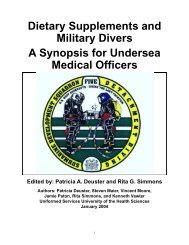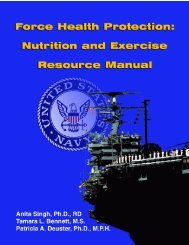Traumatic Brain Injury and Effects of Altitude - Human Performance ...
Traumatic Brain Injury and Effects of Altitude - Human Performance ...
Traumatic Brain Injury and Effects of Altitude - Human Performance ...
Create successful ePaper yourself
Turn your PDF publications into a flip-book with our unique Google optimized e-Paper software.
<strong>Traumatic</strong> <strong>Brain</strong> <strong>Injury</strong> (TBI) <strong>and</strong> <strong>Effects</strong> <strong>of</strong> <strong>Altitude</strong>:An Analysis <strong>of</strong> the Literatureespecially in the context <strong>of</strong> aeromedical evacuation that may require rapid ascent in unpressurizedaircraft. Clinical research to date emphasizes the need for efficient medical evacuation as well as earlymitigation <strong>of</strong> hypoxia, hypotension, ICP, dehydration <strong>and</strong> uncontrolled temperature abnormalities.Specifically, our review <strong>and</strong> analysis finds that:Exposure to very high altitudes can induce brain damage <strong>and</strong> impair cognitive functioning.Hypoxia, which is correlated with poor TBI outcome, likely plays a major role in altitude-relatedbrain injury.Elevated ICP <strong>and</strong> hypotension play an important role in determining outcome from brain injury.Fluid resuscitation <strong>and</strong> management is important to prevent hypotension <strong>and</strong> prevent adverseeffects <strong>of</strong> secondary brain injury <strong>and</strong>/or altitude exposure.Hyperthermia is a risk factor for secondary brain injury. Hyperthermia is common in post-acuteTBI, <strong>and</strong> can be the result <strong>of</strong> environmental high temperatures, strenuous physical activity,infection, or injury-related hypothalamic damage <strong>and</strong> impaired thermoregulation.Hypothermia has been linked to increased mortality in general trauma patients, including thosewith TBI. Hypothermia is a concern in military operational settings <strong>and</strong> in military aeromedicalevacuation, where the average interior temperature <strong>of</strong> a military cargo plane is around 59 °F.To reduce the risks associated with hyperthermia <strong>and</strong> hypothermia, it is important to assess <strong>and</strong>stabilize temperature in the pre-hospital setting.Retrospective clinical studies suggest that preventing hypoxia, controlling high ICP <strong>and</strong> temperaturestabilization are beneficial to TBI patient outcome. Therefore, it is important that TBI patients avoidexposure to hypoxia, hypotension, <strong>and</strong> extreme temperatures in the immediate aftermath <strong>of</strong> injury.Through this analysis, several key knowledge gaps are apparent. Primarily, there is a pressing need forclinical studies <strong>and</strong>/or case reports <strong>of</strong> military aeromedical evacuation <strong>and</strong> transport involving TBIcasualties. Virtually no research has yet been published to address the unique injury <strong>and</strong> treatmentexperiences <strong>of</strong> military TBI casualties in high-altitude settings. Clinical findings are crucial to inform thedevelopment <strong>of</strong> risk <strong>and</strong> injury pr<strong>of</strong>iles <strong>and</strong> protocols which can address timing <strong>and</strong> interventionsneeded to prevent adverse outcomes from exposure to altitude-related factors, as well as secondarybrain injury events. Specifically, additional research is needed to address the following concerns:Identify risks, benefits, intervention strategies <strong>and</strong> outcomes associated with militaryaeromedical transport <strong>of</strong> TBI casualtiesThis information is needed to identify the “ideal time to fly” <strong>and</strong> to inform risk pr<strong>of</strong>iles <strong>and</strong>injury protocols to address the timing <strong>and</strong> use <strong>of</strong> interventions to mitigate adverse effects <strong>of</strong>altitude <strong>and</strong>/or secondary brain injury events.Document the effects <strong>of</strong> altitude exposure on mild TBI (mTBI) <strong>and</strong> blast-induced neurotrauma(BINT)Although mTBI can involve structural neurological damage, little if any research to date hasaddressed the potential impact <strong>of</strong> secondary brain injury processes on mTBI. Most military TBIsare classified as mild, related to the effects <strong>of</strong> blast or explosion. The potential impact <strong>of</strong> altitudeon these injuries is largely unknown.September 14, 2010 2


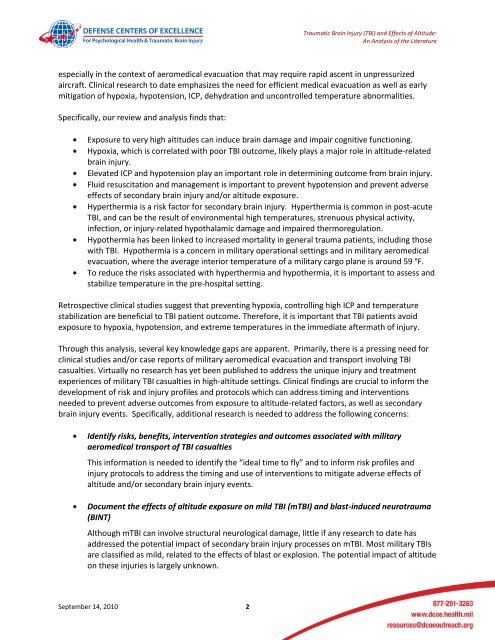
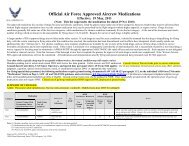
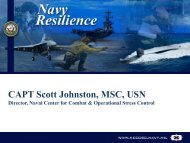
![Body Composition and Military [PDF] - Human Performance ...](https://img.yumpu.com/43269347/1/190x245/body-composition-and-military-pdf-human-performance-.jpg?quality=85)
![Tips for Grocery Shopping [PDF]](https://img.yumpu.com/37447379/1/190x245/tips-for-grocery-shopping-pdf.jpg?quality=85)
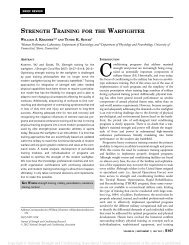
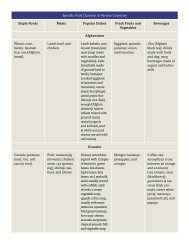
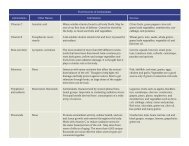
![Synthetic Drugs [PDF] - Human Performance Resource Center](https://img.yumpu.com/37447322/1/190x245/synthetic-drugs-pdf-human-performance-resource-center.jpg?quality=85)
